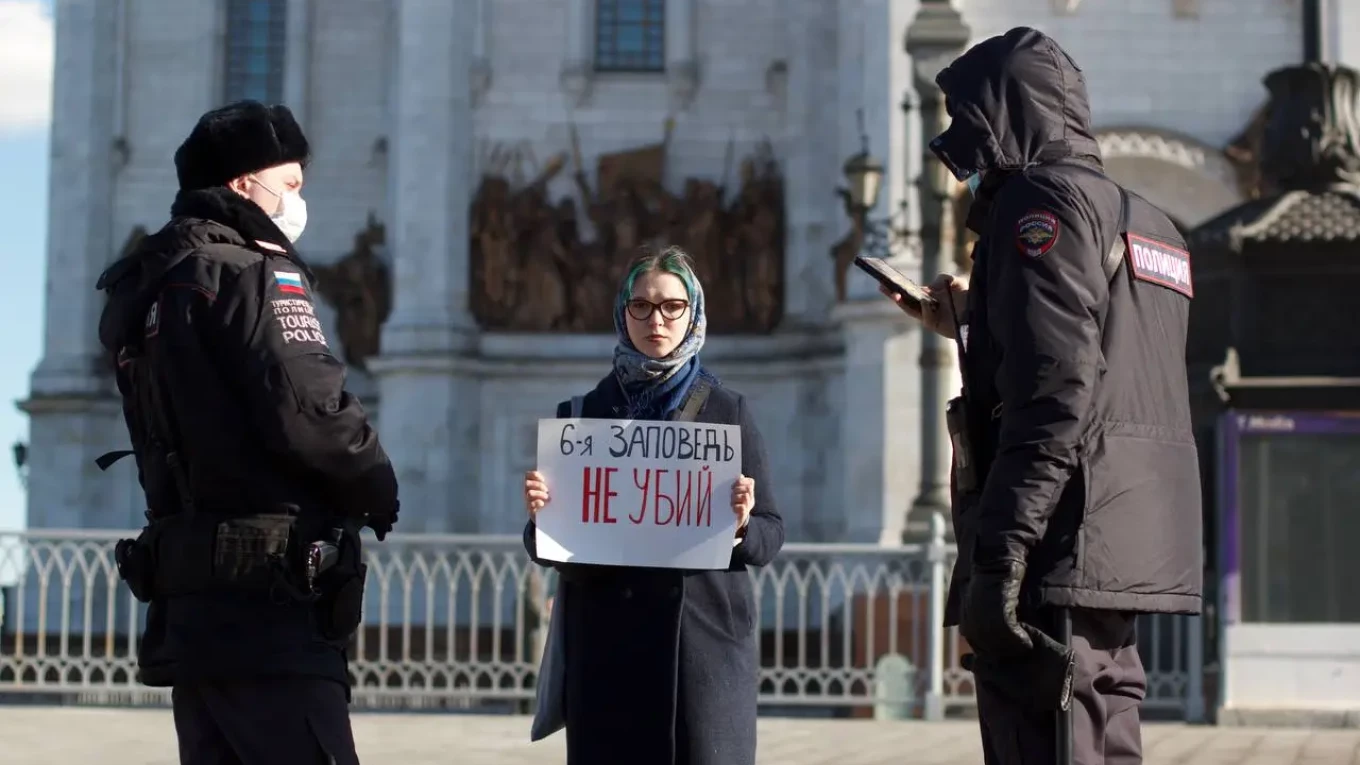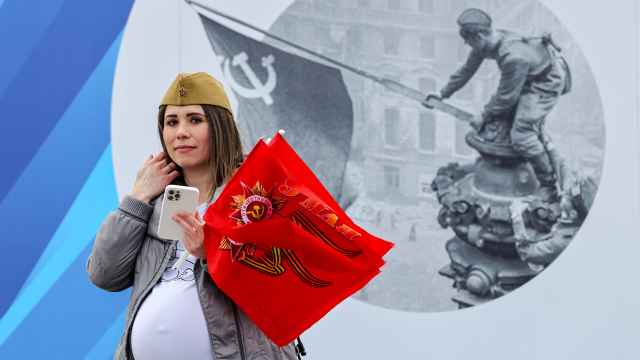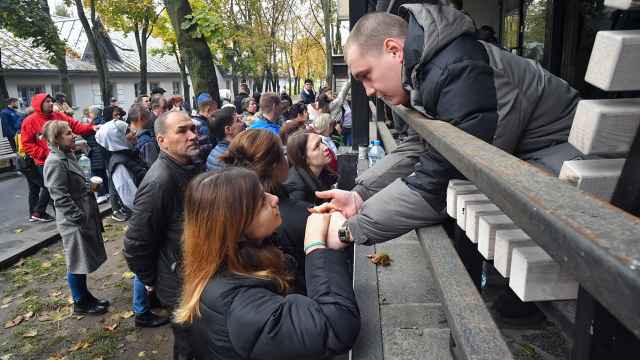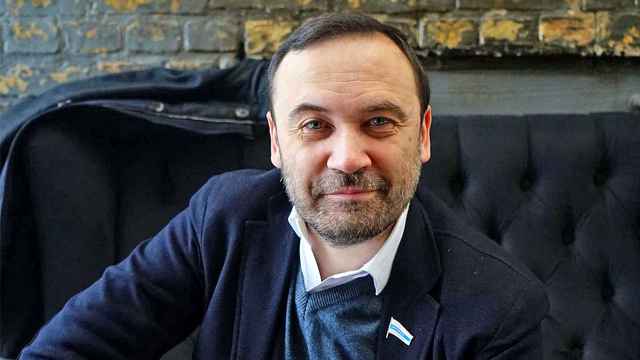The Russian anti-war opposition can bicker on social media and argue at congresses, fail to sign statements and ignore each other’s events — but its members can nonetheless agree on several basic demands: The withdrawal of Russian troops from Ukraine and payment of reparations; a peaceful foreign policy; and the democratization and federalization (or self-determination of regions) of Russia.
However, two events have occurred in the last month: a conference in Brussels involving EU and Russian opposition representatives, followed by Wagner leader Yevgeny Prigozhin's armed rebellion in Russia. This served as a stark reminder that as we pursue the goals of the Russian opposition, we risk straying off course and finding ourselves not in parliament, but in the dark cave of another military dictatorship. Adopting a feminist perspective can help us minimize the risk of taking the wrong turn.
During Prigozhin's mutiny, it was surprising for many of us to witness some Russian opposition politicians calling for armed resistance or expressing solidarity with Prigozhin's army of war criminals, even if only for the purpose of destabilizing the regime. However, this should not have come as a shock to those who were present in Brussels. Some politicians there had advocated for support of the Russian Volunteer Corps, a neo-Nazi armed group that recently carried out an incursion into the Belgorod region. Activists are under no illusions that those capable of armed rebellion in Russia are predominantly right-wing or neo-Nazi groups seeking combat experience on both sides of the frontline. Consequently, a militaristic approach that limits political horizons may lead us only to a military dictatorship focused on perpetuating war rather than ending it.
While the rebellions of these groups destabilize the regime and the frontlines, they do not need our support and will not pay it back. But how can we use the political and military weakening they bring about for the greater good, not for personal power grabs? Putin's public speeches following the mutiny clearly show that he is trying as always to portray himself as the guarantor of stability. Yet, this is far from convincing.
As opinion polls show, both Putin and Prigozhin have experienced a decline in popular support due to the armed confrontation.
Possibly for the first time in Putin's rule, the Russian opposition has an advantage. We have not tarnished our reputation by calling for bloodshed, while Putin and Prigozhin have now created an evident threat to the Russian people. Though they have been the main threat to the Russian people and the world for a long time, the chaos of the war and violence which they could previously target and contain has now spilled over. Consequently, the myth that the opposition and political activists are the ones “rocking the boat” and posing risks to ordinary people is weaker than ever before, and we can use this to our advantage. This realization has been voiced by many political actors. Ilya Yashin and Alexei Navalny, in their letters from prison, also emphasized this contrast between Putin as the source of violence and instability and the political prisoners who are accused of these things but are in fact fighting against it. Many political forces, including Feminist Anti-War Resistance, Soft Power, Vesna and Mikhail Lobanov, to name a few, also published statements that aligned closely with this outlook during the Prigozhin rebellion. They refused to ally with any side, instead calling for cooperation, consolidation, mutual support and care for the community as the opposition to a military solution.
The underlying principle of this perspective is care. Care confronts the narrow focus on only military solutions. And that is where the feminist lens helps us. Indeed, it is predominantly women* who bear the responsibility of caring for families and experience domestic and sexual violence, economic inequality, gender discrimination, and restrictions on reproductive rights. No need to explain the obvious: the role of women in conflict resolution and negotiations proved essential and productive in many cases. This is because the perspective of care and the feminist approach to peacebuilding demands redefining security as the security of life rather than solely that of national borders — and that leads to more sustainable peace. This perspective aligns with Johan Galtung's concept of positive peace, which encompasses not only the absence of direct violence but also structural violence.
Women* already play an essential role in anti-war mobilization. From organizations like Feminist Anti-War Resistance, the grassroots movement I belong to and which mobilized thousands of activists across the country and abroad to protest the invasion of Ukraine, to the mothers, sisters, and wives of soldiers who led anti-mobilization protests last autumn, their impact is evident. The number of female political prisoners and cases of administrative persecution has risen significantly since the start of the invasion. Besides these visible forms of protest, we can also see that it is predominantly women* who help displaced Ukrainians to leave Russia or survive in it, and who help Russians abroad, like Anastasia Burakova’s Ark project. Many other forms of resistance like everyday disobedience and sabotage — so-called weapons of the weak — cannot be seen or reported now. However, we can use opinion polls to suggest that the role of women* is essential. In opinion polls by the Levada Center, ExtremeScan and Russian Field, one can find different indicators of women’s growing dissatisfaction with the invasion. For example, according to the latest wave of the Russian Field poll, 42% of women* would not cancel the start of the invasion if they had the chance, compared to 57% of men.
Moreover, more women* perceive the invasion of Ukraine as a threat to their own lives, with 43% expressing this concern compared to 26% among men — and this is a crucial perspective that we should take into consideration when formulating out political strategies.
Calls into the void for armed resistance at a time when the anti-war opposition lacks the capacity for such action in Russia demonstrate a complete disregard for these significant indicators of popular mood among Russian women*, who also constitute a more statistically significant demographic (by approximately 15%). How can someone who genuinely cares for the well-being of their loved ones favor an armed conflict in their own country? The last wave of opinion polls by Russian Field shows that women* are more supportive of peace negotiations than men. Only 23% of women* would support a second wave of mobilization for the needs of the invasion, versus 50% of men. In contrast, 65% of women* would support peace negotiations in that scenario, while only 41% of male respondents share this view. Generally, support for peace negotiations is considerably higher among women*, with 52% of female respondents believing it is time to move towards peace negotiations compared to 34% of men.
Thus, a considerable portion of women* among the peoples of Russia want peace. Of course, the idea of peace and negotiations has been manipulated by the Kremlin. But why can’t the Russian opposition take over with its alternative peace proposal? If one limits their understanding of peace to a ceasefire and military positions, we have a low chance of garnering support. But it seems impossible only if we do not think of peace from a broader perspective — as a positive peace, as Johan Gatlung put it, i.e., the absence not only of direct violence but also of structural violence.
Putin's consensus is built around relative economic stability and social security. That means our proposal for positive peace should beat Putin’s politics on that field to promote the security of lives instead of military security. We should consider that poverty often compels people to join the military or accept the deaths of loved ones, as well as the wide range of social benefits which were introduced for veterans of this war. The symbolic dimension is essential too, but the status of war hero also has material benefits. Indeed, militarization in Russia is not limited to its military apparatus; it permeates society through social benefits as well.
Therefore, I suggest that we challenge Putin not as a strongman but by tackling another aspect of his image as a defender of Russia's well-being. The masculinist perspective overlooks the part of Putin's public image as a caring man who guarantees some financial stability (albeit often illusory). However, as we know, this image significantly contributes to his popular support. Can we, as the anti-war opposition, develop a peace proposal that will show that we care about the dignity of the peoples of Russia, also in material terms?
What if we think of positive peace as an agreement that guarantees the improvement of living conditions for vulnerable groups in Russia, rather than their deterioration — a peace agreement that will grant people real security of life, i.e. economic, food and physical security? This of course by no means should come at the expense of Ukrainian territories or reparations, as the occupied territories must be returned and reparations paid. But why not consider economic redistribution from the fortunes of corrupt Russian elites and war criminals like Prigozhin and Shoigu? Ukraine should undoubtedly be provided with security guarantees — but could we also explore the possibility of security guarantees for the peoples of Russia against the current Russian state? Some time ago this proposal would have been completely impossible because there is no way for us to develop any vision of peace without a vision from the Ukrainian side. But now we have Zelensky's 10-point plan and a sustainable peace manifesto from Ukrainian civil society: these can be our starting point.
As experts agree, the end of Prigozhin’s revolt is not the end of armed internal conflicts, but just the beginning. Amid this bloody scenario, it is a valid strategy to develop an alternative to violence and arms, promoting instead the security of our lives and the war’s end. I believe we have a chance to succeed if we do not limit ourselves by calling for even more bloodshed, denouncing those who oppose it as “pink ponies” — and instead promote our vision of positive peace, which has the potential to garner popular support and challenge the Russian state and its imperial ambitions.
Editor's note: The term women* is used here to encompass cisgender, nonbinary and transgender women.
A Message from The Moscow Times:
Dear readers,
We are facing unprecedented challenges. Russia's Prosecutor General's Office has designated The Moscow Times as an "undesirable" organization, criminalizing our work and putting our staff at risk of prosecution. This follows our earlier unjust labeling as a "foreign agent."
These actions are direct attempts to silence independent journalism in Russia. The authorities claim our work "discredits the decisions of the Russian leadership." We see things differently: we strive to provide accurate, unbiased reporting on Russia.
We, the journalists of The Moscow Times, refuse to be silenced. But to continue our work, we need your help.
Your support, no matter how small, makes a world of difference. If you can, please support us monthly starting from just $2. It's quick to set up, and every contribution makes a significant impact.
By supporting The Moscow Times, you're defending open, independent journalism in the face of repression. Thank you for standing with us.
Remind me later.








